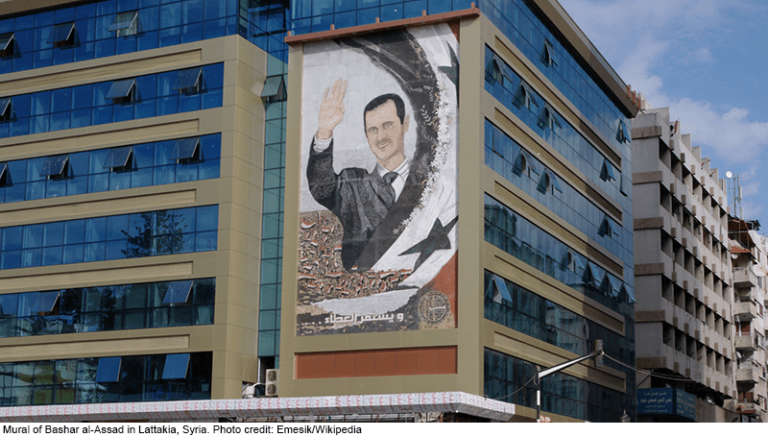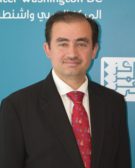
The latest developments in Syria show military successes for the regime of President Bashar al-Assad against both the so-called Islamic State and the Syrian opposition movement. That these victories were achieved with overwhelming assistance from Russian troops and Iranian-supported and allied Shia militias, such as the Lebanese Hezbollah, does not obviate at least three interconnected realities. First, the regime is convinced it can dictate the terms of ending the almost seven-year conflict. Second, the Syrian opposition movement is in disarray and may be poorly prepared to influence the final outcome of the conflict. Third, the opposition is under tremendous pressure to accommodate battlefield realities, and Arab countries that previously supported it are coaxing it to accept whatever face-saving compromise Russia proposes.
To discuss Syria’s latest developments, Dr. Imad K. Harb, Director of Research and Analysis at Arab Center Washington DC, posed a number of questions to Dr. Radwan Ziadeh, former spokesman for the Syrian opposition and currently Senior Analyst at the center, who recently returned from the Middle East. Following is the translated interview.
Imad Harb: What led to changing the composition of the Syrian opposition’s High Negotiations Committee (HNC) at last November’s meeting in Riyadh, Saudi Arabia? And why did the head of the committee, Riyad Hijab, resign from his position?
Radwan Ziadeh: Since its formation in 2015, the HNC has endured much criticism from Syrian activists because of its ineffectiveness and inability to influence events in Syria, especially since the opposition’s loss in eastern Aleppo in 2016, and because of the absence of mechanisms of accountability within the committee. The opposition also suffered many defeats in the eastern Ghouta district close to Damascus and in Daraya, which were followed by consequential and repeated opposition withdrawals from areas it had controlled for years. Of course, the regime’s military successes were assisted by heavy Russian aerial bombardment and violations of the laws of war and the use of prohibited weapons, such as cluster bombs and the targeting of civilian areas with barrel bombs. In fact, the opposition preferred to withdraw from these areas so that they would not be targeted.
At the same time, there were negotiations in Geneva and Astana. During its participation in the Geneva round, the HNC team was criticized by Russia for refusing to go to Astana, pressing for Assad’s departure, and negotiating for a political transition according to United Nations Security Council Resolution 2254. Russia actually accused Riyad Hijab of being an extremist who insisted on preconditions before negotiations.
Hijab thus met with Saudi Arabian Foreign Minister Adel al-Jubeir and requested his assistance in widening the HNC’s representation so that the opposition could be more unified and more capable of resisting Russian pressure. Saudi Arabia agreed and began to prepare for what became known as “Riyadh II” which, since it was to include all factions of the opposition, necessitated discussions with and inclusion of the National Council for the Syrian Revolution and Opposition Forces, which operates from Istanbul, as well as the Cairo Platform, another opposition group.
But as criticism of Saudi Arabia’s war in Yemen increased in mid-2017, the kingdom needed to secure Russia’s support in the UN Security Council as well as the importation of Russian arms after the American and British threats to suspend arms deliveries to Riyadh. Saudi Arabia thus found that it could compromise on its position in Syria with Russia, which was indeed achieved during repeated and mutual visits by the Saudi and Russian foreign ministers. In the process, Saudi Arabia agreed to include the Moscow and Cairo Platforms in the negotiations regarding Syria’s conflict. But it did not secure Hijab’s agreement to this change, which led to his break with his alliance with Saudi Arabia and his subsequent resignation. He also complained that he was not consulted on the choice of those invited to Riyadh II and opposed the inclusion of the Cairo and Moscow Platforms, which did not endorse the ideas of Assad’s departure and a political transition.
Many Syrian activists and participants were actually shocked by the position of Riyadh II and its participants, who appeared to represent the views of regional states. Absent was the original objective of unifying the Syrian opposition in order to secure a political transition from an oppressive regime that killed its people and establish a new democratic system that defends the Syrians’ right to political stability and economic prosperity. Instead, Riyadh II resorted to institutionalizing a system of power-sharing between platforms, prompting many protests and statements that rejected the conference’s decisions and the resultant negotiating team. In reality, Riyadh II closed a painful chapter in the life of the Syrian opposition movement and neglected the wishes of those inside Syria and those outside, in refugee camps, who yearn for a return to their homes and the establishment of an inclusive, fair, and just political system.
IH: After the new negotiating team was formed, what was expected from a new round in Geneva, and what was the regime’s position regarding negotiations on issues such as the political transition and the fate of President Assad?
RZ: The Syrian regime was never serious about negotiations or about a solution that would rest on the previous Geneva understandings that include regime change and transition. Negotiations were an opportunity to buy time and convince the world that the regime was ready to end the crisis, all the time trying to change conditions on the ground. Every round of negotiations has witnessed the regime’s attempt to avoid agreement or implement UNSC Resolution 2254. In the last round in Geneva following Riyadh II, the regime accused the opposition of imposing preconditions. It was even late to arrive in Geneva for negotiations, because of supposed consultations. These were nothing but delaying tactics to nullify any potential results from negotiations and to instill the idea that Geneva was not the right vehicle for ending the conflict.
In reality, the regime still believes that it can decide the end of the conflict militarily on the ground and return to the status quo ante with no concern for the fate of the hundreds of thousands of political prisoners and the millions of migrants, displaced, and refugees who were forced to flee military operations and regime attacks to Lebanon, Jordan, Turkey, and other countries.
IH: In your opinion, what was the main reason for the failure in Geneva? Did Russia try to prevent the collapse of negotiations there? If so, how?
RZ: It was obvious a long time ago that Russia was uninterested in the Geneva process and worked toward aborting it. The reason was that Moscow wanted the Astana negotiations to succeed, where it cooperated with Iran and Turkey and had a measure of control of the process. It has also become obvious that Russia is most concerned about the post-conflict situation in Syria and the potential economic benefits from its role there, as made clear by Russia’s deputy prime minister during his last visit to Damascus.
The main challenge remains in Russia’s inability to declare an end to the Syrian conflict––as is obvious from its reluctance to end the opposition’s pockets of resistance in such places as Idlib, eastern Ghouta, the Hama countryside, and elsewhere––because it cannot lead the reconstruction process in Syria. What Russia sees in Syria may not necessarily be economic largesse but a base to expand to other parts of the region and increase its international influence. With the United States withdrawing from the region under President Trump’s “America First” slogan, Russia is happy to try to exploit its position in Syria in any way possible.
On the other hand, Russia intends to lead the transitional period in Syria through using the Astana—not Geneva—process, which it can fully control. Now, President Putin has called for a new negotiating process in Sochi that has been postponed a number of times and may be held in 2018 under the slogan of a “dialogue among Syrians.” Knowing that this new potential process will be fully controlled by Russia, the Syrian opposition is unlikely to participate, exacerbating Russia’s problems in trying to find an acceptable compromise for everyone.
IH: What happened at the last Astana round of negotiations? Were there any different outcomes?
RZ: The same opposition negotiating team participated in the sixth and seventh rounds—the seventh round was the last one. The Syrian regime refused to sign an agreement regarding political prisoners, which number in the hundreds of thousands. The round appeared meaningless, mainly because the negotiations in Astana were being conducted by outside powers (the guarantor powers of Russia, Iran, and Turkey) without any Syrian participation. All that happened there was the addition of a fourth de-escalation zone in Idlib Province, which at any rate continues to be attacked by the regime. Assad’s forces also attack and continue to lay siege to eastern Ghouta, where rampant malnutrition is killing people. The regime does not even respect UNSC Resolution 2268, which enjoins the warring parties to allow humanitarian assistance to reach blockaded areas.
This is why there is no hope for the success of any new round at Astana: the regime refuses to discuss the matter of political prisoners, and Russia refrains from pressuring the regime to release them and lift the siege off Ghouta and other areas.
IH: Are there any hopes from a new round at Sochi?
RZ: The Syrian opposition refuses to participate in the Sochi negotiations because they have no clear agenda and since nothing has actually changed in both the Syrian regime’s policies and Russia’s stance. In fact, no one is sure that Russia is indeed committed to Sochi if there are no clear outcomes from it. What is interesting in this regard is that Russia cannot afford the costs of holding a new conference and it might have to resort to Saudi Arabia to pay for it. So far, it is hard to believe that Saudi Arabia would underwrite the costs of a conference that would allow Bashar al-Assad to remain in power, as Russia wants.
IH: Considering the current balance of power in Syria, what do you think is the fate of the opposition’s demands regarding Assad’s departure, political transition, regime change, and refugees and the displaced?
RZ: The Assad regime’s military successes, with Russian and Iranian assistance and support, make a unified opposition political force a priority now and in the future. Such a unified front can work internationally, using legal and political tools available in international law, to isolate the regime and make it account for its crimes. Only the opposition can guarantee the realization of the hopes and aspirations of the Syrian people.
It is also important to emphasize that talking about political pragmatism does not mean accepting Bashar al-Assad or his regime. The Syrian revolution began despite its full awareness of the long, dark, and oppressive history of the regime. This is why it is impossible to abandon the demand for a full political transition that would allow the Syrians to exercise their inalienable right to establish a new and open political system through democratic elections in which everyone participates, including refugees wherever they may be. Syrians also need to have a new democratic constitution that guarantees everyone’s rights and freedoms.
The main obstacle in the way to achieve this is a dictator who sacrifices all Syrians so that he can protect his own interests and desires. There is no end to Syria’s conflict, and no return for Syria’s refugees, so long as Bashar al-Assad remains in power. Any changes that have taken place in international actors’ positions will not alter the fact that the dictatorial system that Assad has imposed is still abhorrent to Syrians, and they will not accept its renewal after almost seven years of regime-perpetrated carnage.


